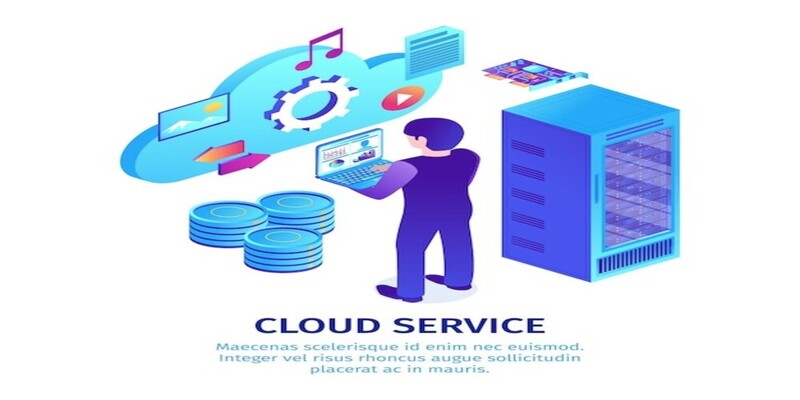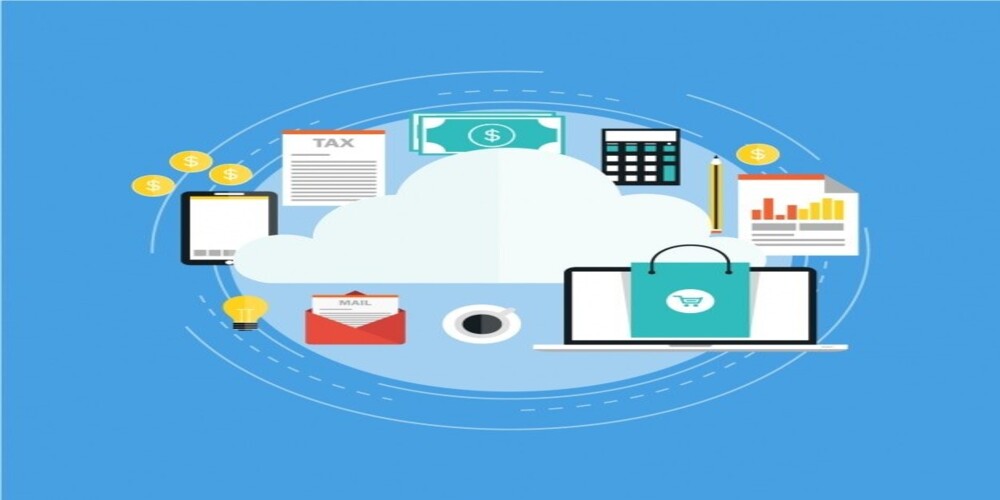
Are you a small business owner looking to get ahead of the curve? Cloud computing is revolutionizing how we do business, making it increasingly easier for entrepreneurs, small businesses, and even large corporations to scale operations quickly. With cloud technology, users can store their data securely on remote servers while accessing them from any device. As a result, more efficient operations management and better collaboration become achievable – allowing businesses of all sizes to experience remarkable growth and success. In this blog post, we will explore how cloud computing has revolutionized for small businesses by introducing improved security measures, enhanced collaboration capabilities, and cost-effective scalability.
Understanding the basics of Cloud Computing.

Cloud computing is a technology that allows users to access and use computing resources over the internet, such as servers, storage, software applications, and databases. These resources are hosted in data centers managed by third-party service providers and accessed via a web browser or specialized software.
It has several advantages over traditional on-premises computing models. It provides greater scalability and flexibility, as users can quickly and easily add or remove computing resources as needed without having to invest in expensive hardware or software. It also enables remote access to data and applications, allowing users to work from anywhere with an internet connection.
There are three main types of cloud computing services:

Infrastructure as a Service (IaaS) provides users virtualized computing resources like servers, storage, and networking. Users can then build their custom applications or services with these resources.
Platform as a Service (PaaS) provides users with a complete platform for developing, testing, and deploying custom applications, without managing the underlying infrastructure.
Software as a Service (SaaS) provides users access to pre-built software applications hosted in the cloud. Users can then access these applications via a web browser or mobile app, without installing or managing any software.
Computing is becoming increasingly popular among businesses of all sizes, due to its many benefits, such as cost savings, scalability, and accessibility. As a result, it is expected to continue to grow and evolve in the coming years.
How it’s different from on-premise solutions
Cloud computing differs from on-premise solutions in several ways.
Firstly, businesses can access computing resources, such as servers and storage, over the internet, rather than managing these resources on-premise. This eliminates the need for businesses to invest in expensive hardware and software upfront and allows them to pay for only the resources they need.
Secondly, it provides businesses with greater scalability and flexibility. With on-premise solutions, businesses are limited by the amount of available hardware, which can be costly to upgrade or replace. In contrast, computing resources can be easily added or removed as needed, allowing businesses to scale up or down as demand changes quickly.
Thirdly, it enables remote access to data and applications, allowing employees to work from anywhere with an internet connection. This can increase productivity and collaboration, as employees can easily access the same data and applications from different locations.
Lastly, businesses do not have to worry about managing and maintaining their own IT infrastructure, as this is done by the third-party service provider. This can free up IT staff to focus on more strategic initiatives, rather than spending time on routine maintenance tasks.
Overall, computing provides businesses with a more cost-effective, scalable, and flexible solution than on-premise solutions. It allows them to access the computing resources they need on-demand, from anywhere, and with minimal maintenance requirements.
Benefits of cloud computing for small businesses

Cloud computing offers numerous benefits for small businesses, including:
Cost savings: small businesses do not have to invest in expensive hardware or software upfront; they only pay for the resources they need. This can save small businesses a significant amount of money, especially in the early stages of their operations.
Scalability: it enables small businesses to quickly and easily scale up or down as their needs change. They can add or remove computing resources as needed without investing in expensive hardware or software.
Accessibility: small businesses can access their data and applications from anywhere with an internet connection. This can enable employees to work remotely or on the go, increasing productivity and collaboration.
Security: Cloud service providers typically offer advanced security features, such as data encryption, firewalls, and intrusion detection and prevention systems. This can help small businesses protect their data and applications from cyber threats.
Disaster recovery: Cloud service providers typically offer disaster recovery services, which can help small businesses quickly recover from unexpected events, such as natural disasters or cyber-attacks.
Collaboration: allows small businesses to easily share data and collaborate on projects with employees, partners, and customers. This can help increase productivity and streamline business processes.
Overall, computing can help small businesses become more agile, efficient, and competitive by giving them access to advanced computing resources, tools, and services previously only available to larger enterprises.
Cost savings associated with cloud computing for small businesses

Cloud computing can provide significant cost savings for small businesses in several ways:
No upfront capital costs: With cloud computing, small businesses do not have to make large upfront investments in hardware, software, or infrastructure. This means they can avoid purchasing and maintaining on-premise servers and storage costs.
Pay-as-you-go: Cloud computing services are typically offered on a pay-as-you-go basis, meaning that small businesses only pay for their computing resources. This can help small businesses avoid overprovisioning and paying for resources that they don’t need.
Scalability: Cloud computing allows small businesses to scale up or down as their needs change quickly. This means that they can quickly adjust their computing resources to match their business demands without investing in additional hardware or software.
Reduced IT staffing costs: With cloud computing, small businesses can reduce their IT staffing costs, as they no longer need to hire staff to manage their on-premise infrastructure. This can allow them to redirect resources toward more strategic initiatives.
Reduced energy costs: Cloud computing can help small businesses reduce their energy costs, as they no longer need to power and cool on-premise servers and storage. This can lead to significant cost savings over time.
Overall, computing can help small businesses save money by reducing their upfront capital costs, providing cost-effective pay-as-you-go services, allowing for easy scalability, reducing IT staffing costs, and reducing energy costs. By leveraging cloud computing, small businesses can access enterprise-grade computing resources at a fraction of the cost of building and maintaining their own on-premise infrastructure.
Security considerations for cloud computing

Cloud computing provides numerous benefits for small businesses but raises essential security considerations that businesses need to address to protect their data and applications. Here are some key security considerations for cloud computing:
Data protection: small businesses must protect their data when stored and transmitted to and from the cloud. They should implement encryption, access controls, and data backup and recovery measures.
Identity and access management: Small businesses must control who has access to their cloud resources and data. They should implement strong authentication measures such as multi-factor authentication and role-based access control to prevent unauthorized access.
Compliance: Small businesses must comply with relevant regulations and standards, such as GDPR or HIPAA. They should work with their cloud service provider to ensure their cloud environment meets these requirements.
Vulnerability management: Small businesses need to regularly scan their cloud environment for vulnerabilities and apply security patches and updates to protect against potential cyber threats.
Business continuity and disaster recovery: Small businesses need to have a plan to ensure that they can recover their data and applications in the event of a disaster or outage. This should include regular backups and testing of their disaster recovery plan.
Third-party risks: small businesses must consider the security risks associated with third-party service providers, such as cloud service providers. They should carefully evaluate their cloud service provider’s security controls and practices to ensure that they meet their security requirements.
Overall, small businesses should carefully consider the security implications of cloud computing and implement appropriate security measures to protect their data and applications.
Examples of successful companies using cloud computing to grow their business.

Many successful companies have used cloud computing to grow their businesses. Here are a few examples:
Netflix: Netflix is a prime example of a company that has used cloud computing to transform its business. By moving its video streaming service to Amazon Web Services (AWS), Netflix was able to quickly scale its infrastructure to meet the demands of its rapidly growing customer base.
Airbnb: Airbnb is another company that has leveraged cloud computing to grow its business. By using AWS, Airbnb was able to scale its infrastructure to handle the increasing volume of traffic on its website. This allowed the company to expand into new markets quickly and offer its services to a larger customer base.
Slack: Slack is a cloud-based collaboration platform that has rapidly grown in popularity among businesses of all sizes. By using cloud computing, Slack was able to quickly scale its infrastructure to handle the growing demand for its services. This allowed the company to focus on improving its platform and offering new features to its users.
Dropbox: Dropbox is a cloud-based file storage and collaboration platform that has become a household name. By using cloud computing, Dropbox was able to quickly scale its infrastructure to meet the needs of its growing user base.
HubSpot: HubSpot is a cloud-based marketing and sales platform that has helped many small businesses grow. By using cloud computing, HubSpot was able to quickly scale its platform to meet the needs of its growing customer base. This allowed the company to focus on improving its platform and offering new features to its users, rather than managing its infrastructure.
In conclusion
Cloud computing is an effective technology solution for small businesses that can greatly impact their bottom line. It eliminates the costs of maintaining on-premise IT solutions and provides added security measures to protect business data. The ability to quickly deploy new applications and services can help companies optimize processes and better serve customers. With many successful examples of cloud computing already in practice, leveraging the cloud could enable your business to compete with larger companies—and stay ahead of the competition. So if you’re looking for reliable technology solutions brand-new customers and further growth opportunities, it might be time to consider making the switch to cloud computing.


